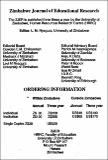| dc.contributor.author | Mtetwa, David K. J. | |
| dc.coverage.spatial | Zimbabwe | en_GB |
| dc.date.accessioned | 2014-10-16T10:15:25Z | |
| dc.date.available | 2014-10-16T10:15:25Z | |
| dc.date.issued | 1992-07 | |
| dc.identifier.citation | Mtetwa, David K. J. (1992) Problem Solving, Beliefs About Mathematics, And The Long Arm Of Examinations, ZJER Vol. 4, no.2. Harare, Mt. Pleasant: HRRC. | en_GB |
| dc.identifier.issn | 1013-3445 | |
| dc.identifier.uri | https://opendocs.ids.ac.uk/opendocs/handle/20.500.12413/4790 | |
| dc.description | A ZJER journal article. | en_GB |
| dc.description.abstract | The recent, almost global, shift in emphasis from computation towards problem solving skills in mathematics education curricula has opened up fresh areas of research. As one of the factors now widely acknowledged as having a tremendous influence on the course and quality of the problem solving process, beliefs about mathematics have been the subject of a number of studies including the present one.
The main objective of this study was to explore and uncover the kinds of beliefs Zimbabwean secondary school students hold concerning the nature of mathematics, the leaning of mathematics, and the doing of mathematics. The study focused on Form 4 students (11th graders, typically 16 years old) and used in-depth individual interviews of 10 students (4 of them males) to gather data. A preliminary survey was used to structure the interviews, and video-taped observations of classroom sessions were done to explore the relationship between the beliefs and the context in which most of the mathematics is learned.
Analysis uncovered 46 beliefs. The nature of the beliefs suggests that the students simultaneously and mostly subconsciously hold two distinct views of mathematics. The views, which can be characterized as "discipline" mathematics and "examination” mathematics, overlap to varying degrees in different individuals and have conflicting characteristics in some aspects. Furthermore, the views appear to be strongly influenced and dominated largely by an evaluation effect originating from the practice and culture of summative national examinations and, to some extent, by the nature of the mathematics curriculum and a lack of exposure to genuine problem solving activities in the students’learning experiences. | en_GB |
| dc.language.iso | en | en_GB |
| dc.publisher | Human Resources Research Centre (HRRC); University of Zimbabwe. | en_GB |
| dc.rights.uri | http://creativecommons.org/licenses/by-nc-nd/3.0/ | en_GB |
| dc.subject | Education | en_GB |
| dc.title | Problem Solving, Beliefs About Mathematics, And The Long Arm Of Examinations. | en_GB |
| dc.type | Article | en_GB |
| dc.rights.holder | University of Zimbabwe. | en_GB |


